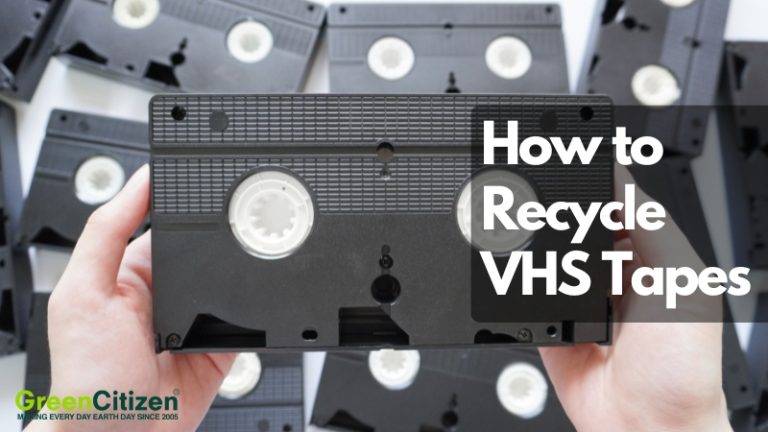We’ve all been there: you’re cleaning out the garage, rediscovering that dusty box of VHS tapes, and suddenly, you’re hit with a wave of nostalgia. Back to the Future marathons, grainy home videos of birthday parties, and that one Friends episode you taped off TV.
But let’s face it—your VCR has been retired for decades, and those tapes aren’t doing anyone any good sitting in a landfill.
Let’s take a little trip down memory lane.
In the USA, the last standard VHS release on home video happened on March 14, 2006. Funai Electric made the last player in July 2016. These VHS tapes are as dead as the dodo, and there’s no sign of them making a comeback. DVDs and streaming have long taken tapes’ place as the movie formats of choice.
Now, you might be asking yourself, “What on earth do I do with all these old VHS tapes lying around?”
Can you recycle VHS tapes?
Yes, you can recycle VHS tapes — but not in your curbside bin.
VHS tapes contain recyclable materials like #5 polypropylene plastic and Mylar tape, a type of polyethylene terephthalate (PET). However, their mixed components — especially the magnetic tape — make them hard to process in regular recycling facilities.
You’ll need to bring them to a specialized e-waste recycler or VHS recycling program that accepts magnetic media.
Key Takeaway: How to Recycle VHS Tapes
To recycle VHS tapes responsibly, first protect any personal recordings by recording over them or removing the magnetic tape. Then, choose one of these five options:
- Use a mail-in or drop-off recycling program like GreenCitizen.
- Donate tapes to thrift stores, creative reuse centers, or media preservation groups like the Internet Archive.
- Sell rare or collectible tapes on marketplaces like eBay or to local vintage stores.
- Upcycle tapes into storage boxes, décor, or digitize and recycle the shells.
- Check for local e-waste collection events or hazardous waste days that accept VHS tapes.
Curbside bins won’t take VHS tapes due to their mixed materials. Always confirm with your chosen recycling or donation site before dropping off.
Note: GreenCitizen editorial team reviews the products independently with extensive research. This post contains affiliate links and we may earn affiliate commissions if you purchase anything using our links. Check our complete affiliate disclosure for more information.
How To Recycle VHS Tapes and Cassette Tapes: 5 Options
How to Prepare VHS Tapes for Recycling
Before recycling your VHS or cassette tapes, make sure you protect your personal recordings.
If the tapes contain home videos, you have two options:
- Record over the footage using static from a blank TV channel.
- Open the cassette shell with a small screwdriver and manually remove the magnetic tape inside.
Heads up: Taking apart tapes can be tricky and messy — especially if you’re not familiar with handling small tools or electronics.
The good news? Recyclers like GreenCitizen don’t require you to destroy your tapes beforehand. We handle data destruction and safe disposal in-house, so you can skip the DIY risks.
Quick Note: VHS tapes are made of #5 polypropylene plastic, but they also include magnetic tape, metal screws, and labels — which make curbside recycling impossible. Prepping helps ensure safe processing by e-waste recyclers.
1. Recycle VHS Tapes Through Drop-Off or Mail-In Programs
VHS tapes are considered electronic waste because they contain magnetic tape, metal screws, and a polypropylene plastic casing. Some even include trace amounts of chromium or other toxic materials, making them unsafe for curbside recycling.
To recycle them properly, look for programs that accept magnetic media. GreenCitizen offers a convenient mail-in recycling service for VHS and cassette tapes across the United States. If you’re located in the San Francisco Bay Area, you can also drop off tapes at our Burlingame EcoCenter.
Not nearby? Use our Green Directory to find VHS tape recyclers near you. Just enter your ZIP code, choose “VHS tapes” as the item, and set a search radius. The tool will show you a list of verified local e-waste recycling centers.

Another reliable option is GreenDisk, a national mail-in program that accepts VHS tapes along with DVDs, cords, and other obsolete tech.
Some retail stores like Best Buy and Staples may accept small e-waste items, but always call ahead—VHS tape acceptance varies by location.
Some recycling centers don’t take magnetic media at all, so it’s important to confirm before visiting.
2. Donate VHS Tapes for Reuse or Preservation
Not all VHS tapes belong in the recycling bin. If your tapes are in good condition, you might be able to donate them for reuse.
Some thrift stores still accept VHS tapes, especially if they’re popular titles or kids’ content. Call ahead to confirm, as many locations have stopped accepting them due to low demand.
For rare, collectible, or historically valuable tapes, consider donating to the Internet Archive (San Francisco) or the VHS Preservation Society. These organizations aim to preserve outdated media for cultural and educational purposes.
You can also donate old tapes to creative reuse centers, schools, or community art programs. Locations like Austin Creative Reuse and Pittsburgh Center for Creative Reuse often welcome magnetic media for upcycled art projects, educational kits, or maker workshops.
Before donating, make sure your tapes are clearly labeled, clean, and still playable to ensure they’re actually useful to the recipient.
3. Sell Your VHS Tapes to Collectors and Resellers
If your VHS tapes are in decent condition, there’s a chance they’re worth something — especially if they’re cult classics, first editions, or contain original commercials.
You can list them on eBay, Facebook Marketplace, Mercari, Nextdoor, or Etsy. Tapes with niche appeal — like The Lion King with original previews, out-of-print horror films, or local news footage — often attract collectors.
Some vintage stores, like Half Price Books and FYE (For Your Entertainment), may buy tapes depending on their local policies. Call your nearest location to confirm they accept VHS.
Collectors also hang out on online forums such as Reddit’s r/VHS and VHSCollector.com, where you can ask for pricing help or find direct buyers for rare tapes.
Pro tip: Check completed listings on eBay to get a sense of what your tapes are actually selling for.
4. Upcycle or Repurpose Your Old VHS Tapes
If you’re feeling crafty, VHS tapes offer surprisingly fun ways to upcycle and repurpose old media instead of tossing it.
You can turn VHS cassette cases into quirky storage boxes for jewelry, screws, sewing kits, or gift card holders. Some people use the spools and reels to make wall art, retro lamps, or even garden decorations.
Holding onto home videos? Digitize the footage using services like Legacybox, Southtree, ScanMyPhotos, or Costco’s DVD transfer service, then recycle or repurpose the empty tape shells.
DIY lovers also experiment with using VHS tape ribbon for weaving, costume design, or art installations — especially in classrooms or maker spaces.
Upcycling gives your old tapes a second life — and keeps plastic and magnetic media out of landfills.
5. Recycle VHS Tapes at Local E-Waste Events and Community Programs
Many cities host e-waste collection events where residents can drop off old electronics, including VHS and cassette tapes.
To find an upcoming event, check with your local waste management authority, municipal recycling department, or neighborhood household hazardous waste (HHW) program. These events often happen seasonally or as part of Earth Day, spring cleaning, or back-to-school drives.
You can also call nearby Staples, Best Buy, or use Call2Recycle to ask whether they accept magnetic media at their next drop-off event — participation varies by location.
Some creative reuse organizations and artist-in-residence programs also accept VHS donations.
Examples include:
- The Scrap Exchange in Durham, NC
- Materials for the Arts in New York City
Events and donation programs may have specific rules, so always verify whether VHS tapes are accepted before loading up the trunk.
How GreenCitizen Recycles VHS Tapes
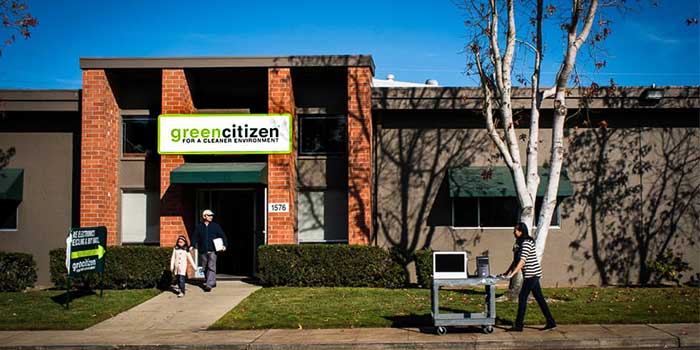
At GreenCitizen, we ensure VHS tape recycling is both secure and environmentally responsible.
Our process involves a dual-layer data destruction method.
First, we erase data through degaussing, then we send the tapes to Reworld’s Waste-to-Energy (WTE) facility for incineration. This ensures that sensitive data is completely erased while repurposing waste into renewable energy.
Step 1: Sorting and Tracking Process for VHS Tape Recycling
Once VHS tapes arrive at GreenCitizen’s facility, they go through a detailed sorting and tracking process to ensure full accountability and responsible recycling.
- Each tape is manually counted and cross-checked against the expected quantity.
- If there’s a discrepancy, GreenCitizen immediately contacts the customer for verification.
- Every VHS tape is logged into GTAMS (GreenCitizen Total Accountability Management System), with a unique serial ID.
This process ensures that every VHS tape is accounted for, preventing illegal dumping in developing countries and ensuring responsible disposal.
With this strict chain of custody, we guarantee that VHS tapes are either securely degaussed and incinerated at a Waste-to-Energy facility or responsibly processed in compliance with environmental regulations.
Step 2: Degaussing – Wiping Data Clean
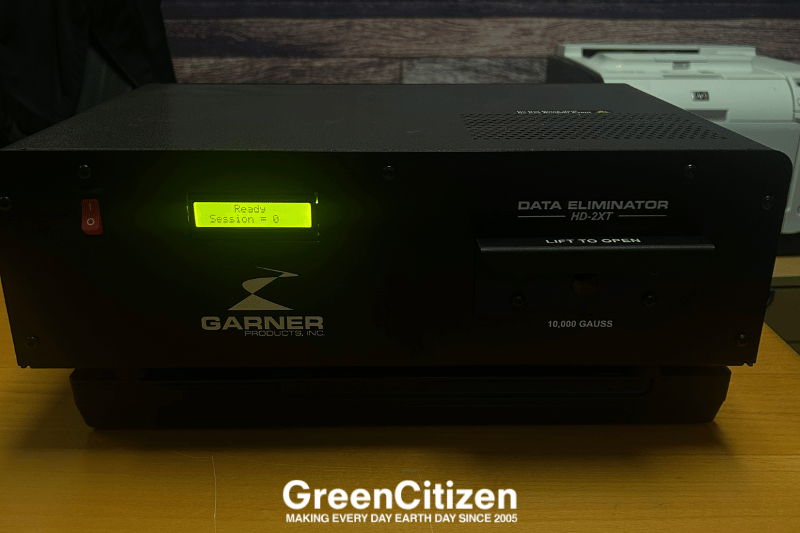
As mentioned, degaussing is our first step for recycling. Here at GreenCitizen, we take data security very seriously and will not compromise the safety of your data.
Magnetic tapes and hard drives store data (video and audio for VHS tapes) in organized magnetic patterns representing binary codes (1s and 0s). When exposed to a powerful electromagnetic field, these patterns are scrambled, making the data completely unrecoverable.
Our degaussers are specifically calibrated to generate a strong electromagnetic field powerful enough to neutralize data storage patterns. Once activated, the degausser produces an intense electromagnetic field that penetrates the entire surface of the tape.
This field overwhelms and disrupts the original magnetic alignment of the data-storing medium.
Degaussing ensures that data cannot be recovered by any means. After degaussing, the media is transported and disposed of at Reworld, our recycling partner, where it is incinerated.
Step 3: Waste-to-Energy (WTE) Recycling
We take them to Reworld for incineration. Reworld’s Waste-to-Energy (WTE) plants convert municipal solid waste (MSW) into energy, typically in the form of electricity or steam.
These plants help reduce landfill use while generating renewable energy.
Reworld employs waste-to-energy incineration to convert non-recyclable materials into usable energy. The tapes are fed into high-efficiency mass burn furnaces, where they undergo combustion at extreme temperatures, turning waste into electricity and steam for local energy grids.
Advanced air filtration and scrubbing systems capture and neutralize harmful emissions, making the process more environmentally friendly.
Reworld’s incineration processes meet federal and industry standards (e.g., EPA, HIPAA, and DoD regulations) for secure destruction. Once incinerated, tapes are reduced to non-recoverable ash, ensuring that no data remains. By using high-temperature incineration, Reworld guarantees permanent data destruction while contributing to sustainable energy production.
How Our VHS Tape Recycling Method Is Unique
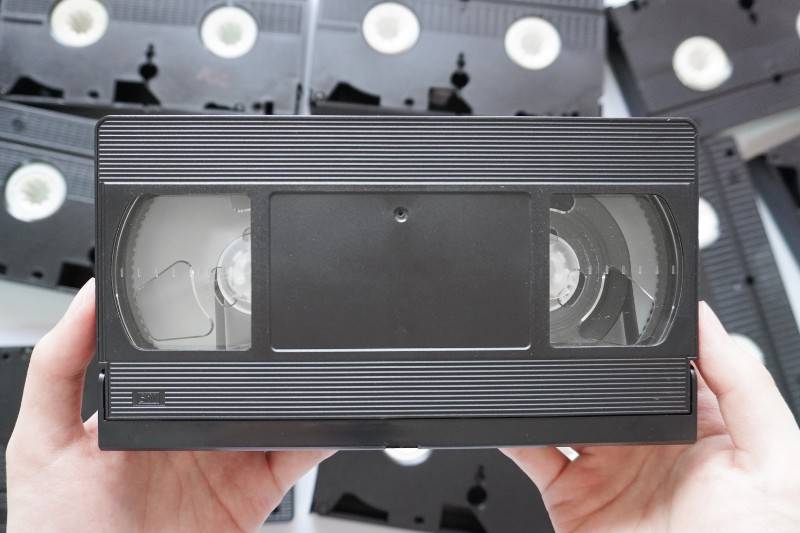
Our total accountability, zero-landfill commitment, and complete material repurposing set us apart.
While most VHS tape disposal methods lack traceability, we use our proprietary GreenCitizen Total Accountability Management System (GTAMS) to track and document every tape throughout the recycling process.
This ensures that nothing ends up in landfills or is illegally dumped overseas.
We exceed industry standards with dual-layered data destruction—we wipe the tapes, and then incinerate them to ensure maximum data security. This extra layer of security ensures that even if a tape were removed before incineration, its data would still be completely unrecoverable.
Nothing goes to the landfill.
Reworld’s waste-to-energy process ensures that every part of the tape is destroyed and repurposed into energy, meaning nothing is wasted.
The Waste-to-Energy (WTE) or Energy-from-Waste (EfW) is widely recognized as a technology that can help mitigate climate change.
According to the Environmental Protection Agency (EPA), every ton of municipal solid waste processed at an EfW facility prevents the release of approximately one ton of carbon dioxide equivalent emissions into the atmosphere.
The EfW facility does this by avoiding methane generation at landfills, offsetting greenhouse gases from fossil fuel electrical production, and recovering metals.
Landfills are the largest source of human-made methane.
Methane has been found to be over 30 times more potent greenhouse gas than carbon dioxide, according to the International Panel on Climate Change (IPCC).
If we apply the waste-to-energy (WtE) model globally, there’s a potential to save 3.7 billion metric tons of greenhouse gases as CO2 each year. That’s equivalent to installing two million one-megawatt wind turbines or doubling nuclear power plant capacity!
In the United States, you can help reduce greenhouse gas emissions, equivalent to closing more than 60 large coal-fired power plants if you recycle VHS tapes with GreenCitizen.
Recycling VHS Tapes with GreenCitizen
With GreenCitizen, you can recycle VHS and cassette tapes—whether you’re a business or an individual. We make the process simple and responsible.
For Businesses
Easily schedule a pickup for your old VHS tapes through our Business Recycling Pickup page.
We offer local business pickups Monday to Friday from 10 AM – 6 PM.
- Step 1: Fill out the form with your business details and the number of VHS tapes for recycling.
- Step 2: Click “Request Pickup”—we’ll take care of the rest.
Prefer shipping? No problem.
Visit our Mail-In Recycling page and follow the easy instructions to send us your tapes hassle-free.
For Individuals
Pack up your used VHS tapes and drop them off at our Burlingame EcoCenter:
📍 1831 Bayshore Highway, Suite 2, Burlingame, CA 94010
⏰ Open Monday to Friday, 10 AM – 6 PM
We charge $6 per lb. for recycling, $20 per unit for destruction, with an optional $5 certification fee for documented recycling.
Can’t make it in person? You can also mail your VHS tapes to us! Visit our Mail-In Recycling page for step-by-step instructions.
How To Get Rid of VHS Tapes for Money
Depending on the content and condition of your VHS tapes and audiotapes, they might be worth something to somebody. You might not be aware of it, but people recycle and collect all kinds of things, and that includes VHS tapes.
These are the different ways that you can get rid of VHS tapes for money:
- If you can’t recycle VCR tapes, you could sell them online to the highest bidder. We’ve seen rare ones go for as much as $9,000!
- You can also get rid of them by bringing the buyers to you via a yard sale or a Craigslist ad.
- While the stores that used to sell and rent VHS tapes are mostly out of business, you can still find music stores that might be interested in trading a VHS tape or an audio cassette for cash.
- There are still a few people in the world who love audio and VHS tapes as a recording medium, and they might be interested in recycling your VHS tapes collection as raw materials to erase, reuse, and recycle.
Aren’t glad for this insider information on what to do with old VCR tapes?
Where To Donate VHS Tapes
If you’re looking to donate or recycle VHS tapes in the modern age, you’re mostly going to be dealing with niche markets and collectors.
Here are some of the places where you can donate VHS tapes:
Local Recycling Companies
First things first, check if there is a local recycling company you can donate them to. Some local recycling services have specialized VHS tapes recycling services.
Libraries or Charity Shops
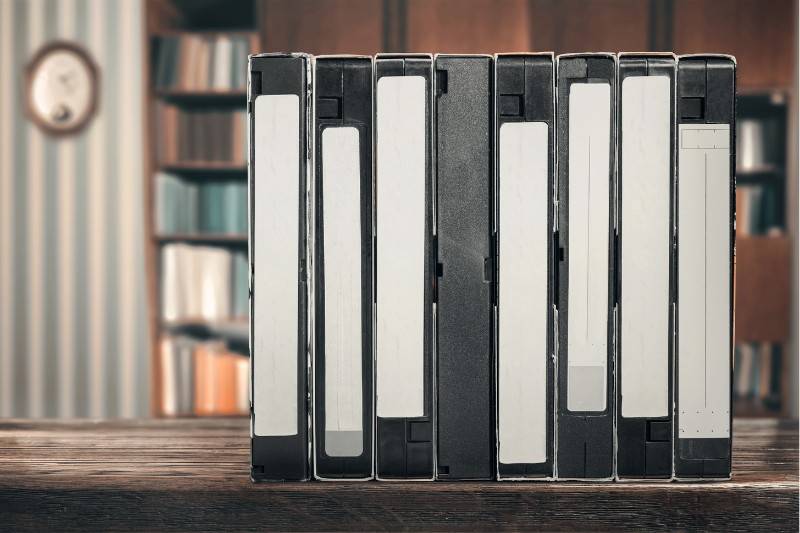
You could also donate VHS tapes to library services or to a local charity shop if they accept them.
Vintage Shops and Record Stores

You can also try looking for local vintage shops and old record stores that may sometimes get customers that are interested in VHS tapes and cassettes.
How To Reuse VHS and Cassette Tapes
If you’re wondering what to do with VHS movies, wonder no more. If you’re crafty, there are so many various ways you can decorate VHS tapes or their cases.
For example, you can recycle and repurpose plastic VHS tape cases into tote bags and purses as seen in the video below.
People also often make interesting lights and lamps from VHS tapes. You can recycle the clear plastic windows in the front of the tapes to emit light.
For example, this YouTube tutorial uses the tape to create a beautiful lamp.
How Can I Save My Content from VHS Tapes, Data, and Cassette Tapes?
Want to know how to dispose of VHS tapes and cassette tapes while keeping your precious memories alive?
Before recycling or sending tapes off for VHS disposal, you should save that irreplaceable content by converting your VHS tapes to digital format.
For this, I recommend Legacybox because it’s the most dedicated company to offer professional quality video digitizing services.
They helped me convert all my old VHS tapes to the digital formats of my choice — whether it was to a DVD, a USB drive, or to the cloud.
VHS to DVD Conversion Service
Their Convert Video To Digital service is compatible with many different systems, so you don’t have to go through the hassle of looking for any other service to digitize all your old media.
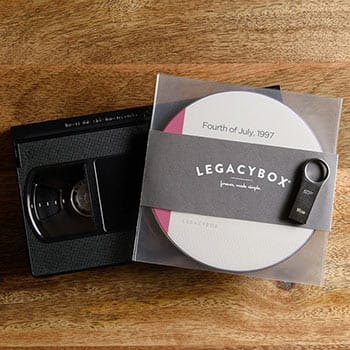
To use their service, all you need to do is order a Legacybox kit. Once you receive your kit, just pack your VHS tapes along with the safety barcode labels that come with it. This is to make sure that all your tapes are properly tracked and accounted for. Then send the kit back to them (for free).
After that, they’ll send you back your newly digitized videos along with your original VHS tapes within a reasonable amount of time.
What one of the things I appreciate the most about Legacybox is that you get regular personalized email updates about your items, giving you peace of mind that your memories are being well-taken cared of. No other digitizing service does that as far as I know.
Cassette Tapes to CD/Digital/Cloud Conversion Service
Meanwhile, what do you do with old cassette tapes once you’re ready to get rid of them? How can you convert their contents to digital format?
Good thing is, Legacybox can also convert your audio cassette tapes to whatever digital format you choose.
With their Convert Cassette Tapes to Digital service, any kind of tape is fair game for conversion, whether it’s a compact cassette, audio cassette, reel-to-reel tape, or cassette tape.
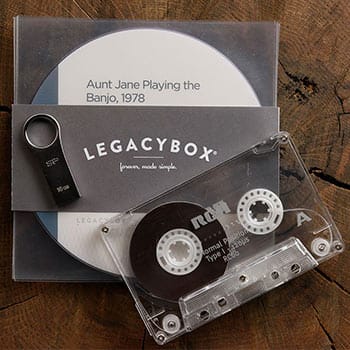
Legacybox is popular for a lot of users because their professionals, technology, and facilities are some of the best in the industry when it comes to digitizing analog media.
Their prices are reasonable as well, which allows you to preserve your priceless moments without burning a hole in your pocket.
I like them because they have allowed me to breathe new life back to my analog media and recover important memories, which is the whole point, isn’t it?
Why Is It Important To Recycle VHS Tapes?
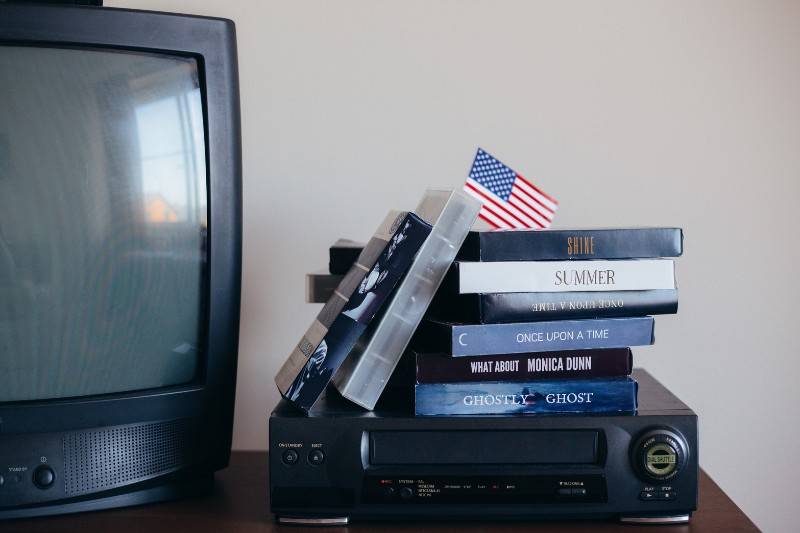
It’s important to recycle VHS tapes because the Mylar plastic tape inside is coated with metals considered to be hazardous waste, while the rest is made from #5 plastic which will take centuries to degrade.
However, this also makes recycling VHS tapes difficult. You can’t simply throw them into the plastic recycling bin or bring them to the landfill.
Why?
Because if they sit in the landfill for too long, the toxic metals in VHS tapes will seep into the ground.
Another reason why it’s difficult to recycle VHS tapes is because they’re not cost-effective.
The same can be said when you recycle cassette tapes.
Here’s the thing: The value of getting anything useful out of them is below the cost in person-hours required to break the tapes down for plastic recycling.
In fact, next to Styrofoam, those two things might be the most difficult household items to recycle.

Read More:
What Are VHS Tapes?
What Does VHS Stand For?
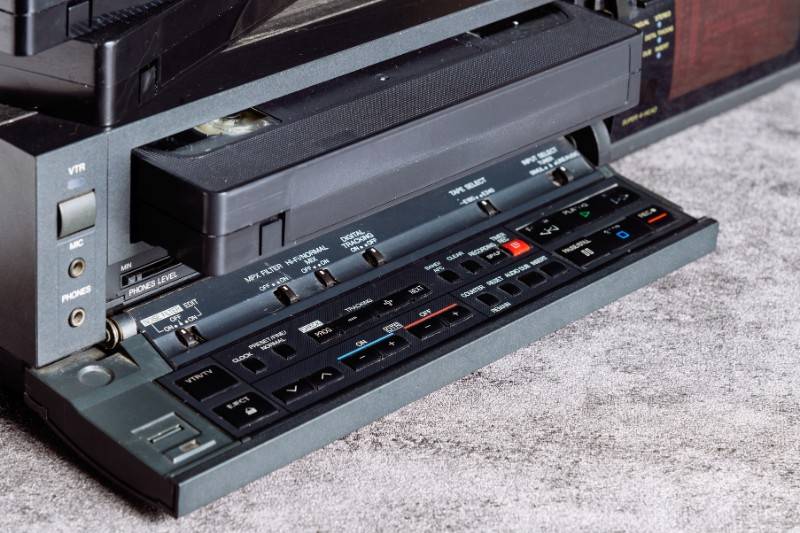
VHS (Video Home System) tapes are analog video cassettes used for recording and playing video content.
Developed by Victor Company of Japan (JVC) in the early 1970s, VHS tapes were released in Japan on September 9, 1976, and in the United States on August 23, 1977.
They remained widely used until the early 2000s before being replaced by DVDs, Blu-rays, and streaming services.
Before VHS, magnetic tapes were already used in the television industry.
VHS’s biggest competitor was Sony’s Betamax format, introduced in Japan on May 10, 1975. Betamax had better video quality but was more expensive and had shorter recording times.
VHS, with its affordability and longer recording capacity, became the standard home video format.
Key Features of VHS Tapes
- Format: Rectangular cassette containing 1/2-inch-wide magnetic tape that stores analog video and audio.
- Video Quality: Standard-definition, lower resolution than modern digital formats.
- Recording Capacity: Typically 120 to 240 minutes of video, with longer tapes having lower quality.
- Playback and Recording: VHS players (VCRs) could both play and record video content.
How VHS Tapes Work
Inside a VCR, the VHS tape moves over video heads, which encode or read magnetic signals storing the video and audio. The VCR then transmits the signal to a TV or display device.
Common Uses of VHS Tapes
- Home Entertainment: Watching movies, recording TV shows, and storing home videos.
- Video Rentals: Video stores like Blockbuster offered movies on VHS.
- Commercial Use: Businesses and schools used VHS for training and instructional videos.
Challenges with VHS Tapes
- Degradation: Magnetic tapes lose quality over time, becoming brittle or stretched.
- Storage Issues: VHS tapes are bulky and require proper storage.
- Obsolescence: VCRs are no longer manufactured, making it harder to play VHS tapes today.
What Are VHS Tapes Made From?
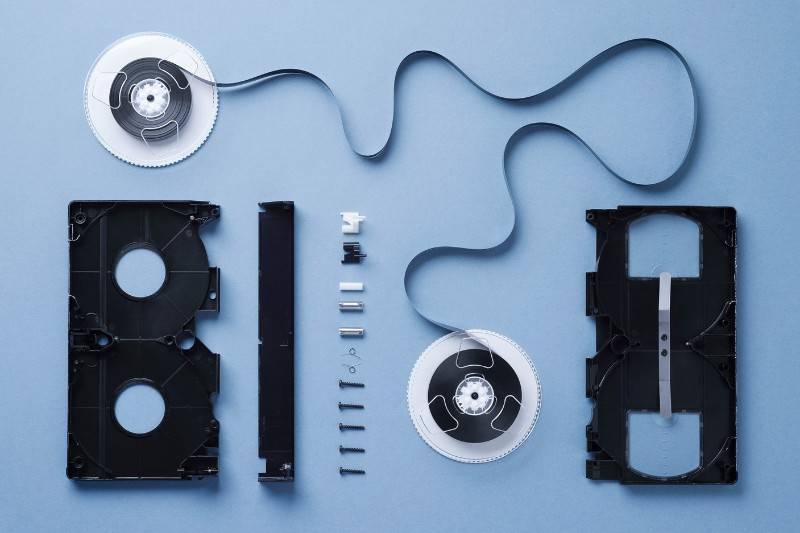
VHS tapes are made from #5 plastic and Mylar.
The outside case is made from #5 plastic (polypropylene), which will take centuries to biodegrade (via microorganisms) or photodegrade (via sunlight).
The plastic tape inside, on the other hand, is made from Mylar (polyethylene terephthalate). It’s a #1 plastic that’s coated with chromium, iron oxide, and other metals considered to be hazardous waste.
How About Computer Data Tapes?
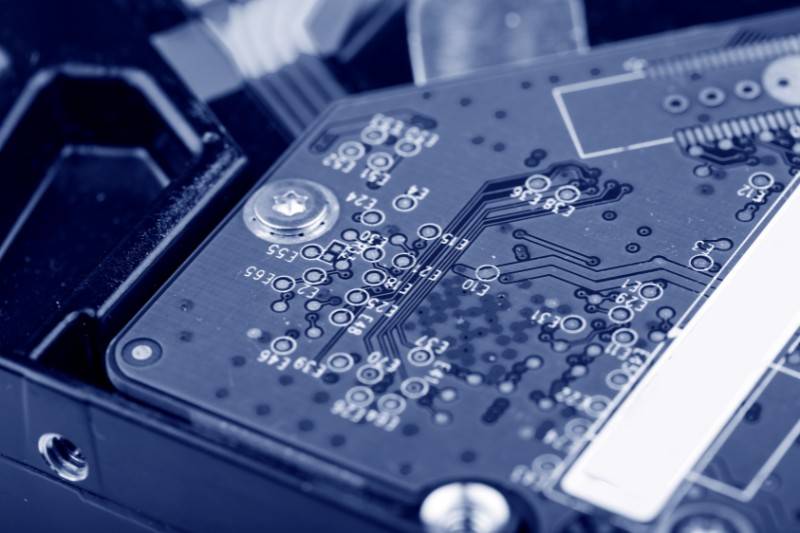
Computer data tapes have similar disposal and recycling issues to old plastic VCR tapes.
For decades, old computer data tapes were widely used to back up data on mainframe and minicomputers used by businesses, institutions, government, and the military.
The data stored on these old tapes are often highly sensitive. Whether it’s backup data from a hospital, a bank, or a loan company, it’s all confidential information about people and businesses.
As such, recycling old data tapes should be done with great care to avoid identity theft and security breaches from the tape’s sensitive information.
Frequently Asked Questions (FAQ)
Yes, VHS tapes are recyclable. You can recycle them with specialist VHS tape recycling services like GreenCitizen, though there will normally be a fee. You could also choose to send them to a waste-to-energy incineration recycling plant where they will be burned to produce green energy.
Best Buy does not recycle VHS tapes. However, it does recycle old VCRs and camcorders, so there may be some related items that you can send to Best Buy. Depending on the item you’re recycling, they may recycle for free or they may charge a small recycling fee.
You can buy old VHS tapes on websites like eBay. You might also find them on Facebook marketplace groups and other online forums where people buy and sell items. Some charity shops, vintage shops, and record stores might also sell them.
Some charity shops might still take VHS tapes, but many of them will not do so anymore. Unfortunately, VHS tapes just don’t sell well in these shops, so they would rather save their shelf space for DVDs. However, some vintage shops and old record stores will sometimes accept VHS tapes and might even pay for them.
You can’t throw VHS tapes in the garbage because when they go to the landfill, they will not decompose for around 1,000 years, which will contribute massively to climate change. Instead, try to recycle, sell, or repurpose them where possible.
Staples does not currently recycle VHS tapes. If you want to get rid of them, you’ll need to use a recycling service like GreenCitizen that does VHS tapes and cassette tapes recycling. You may also be able to send them to a facility that burns trash to produce green energy.
Most pawnshops will not buy VHS tapes because they are worth so little. Unless your VHS tapes are rare or are highly sought-after by collectors, then they won’t probably be bought by a pawnshop. Pawning them is nonetheless worth a try if you really don’t know what to do with old VHS tapes.
Some Oxfam shops do take VHS tapes, but it’s not very common these days. Even if you find an Oxfam that does accept VHS tapes donations, they’ll probably only accept only a few pieces rather than a large collection.
Yes, you can donate VHS tapes to Goodwill. According to their website, they accept several forms of media including VHS tapes, DVDs, CDs, Blu-Rays and vinyl records. So if you don’t know what to do with VHS tapes, Goodwill is a great place to try.
Take Action: Recycle Your VHS Tapes Responsibly
Recycling VHS tapes and cassette tapes isn’t always simple, but it’s essential to keep harmful plastics and chemicals out of landfills. Every tape you recycle helps reduce e-waste and protect the environment.
If you’re in the San Francisco Bay Area, take action today:
- Businesses can schedule a recycling pickup (available Monday–Friday, 10 AM – 6 PM).
- Drop off your VHS and cassette tapes at the GreenCitizen EcoCenter.
- Mail them in using our hassle-free Mail-In Recycling service.
Together, we can ensure that no VHS tape ends up in a landfill.
Start recycling now!
